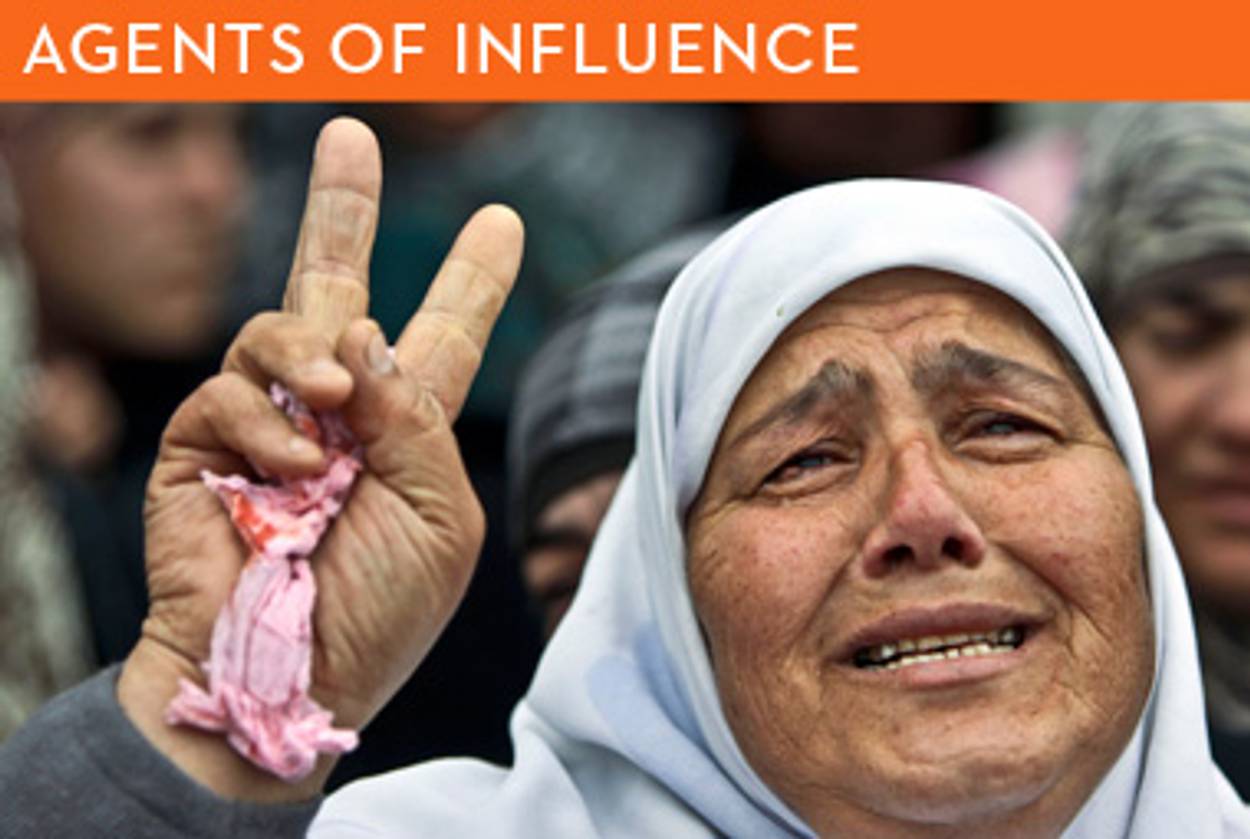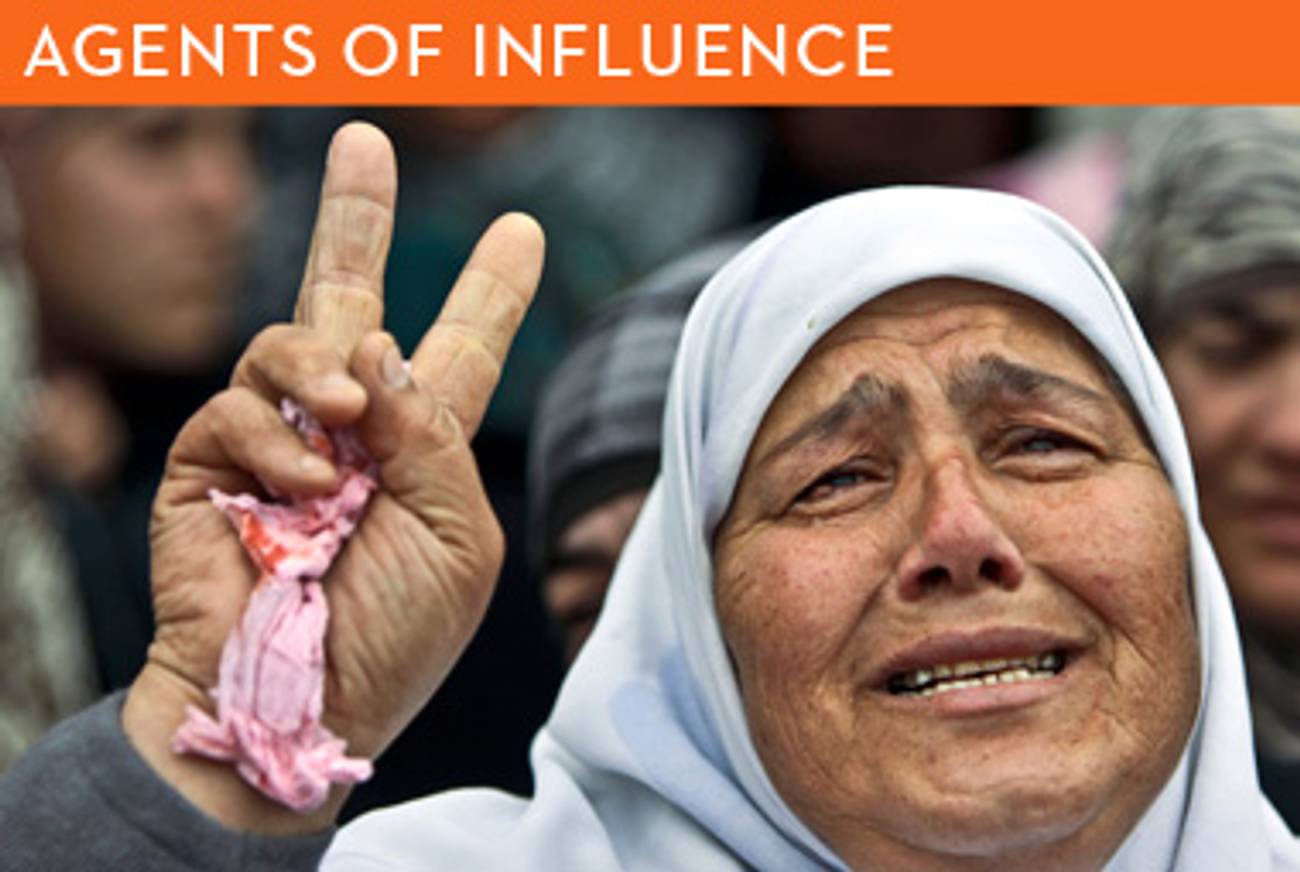Assisted Suicide
When the Western press gives credence to anti-Israel propaganda, as it did in recent reports about a Palestinian woman killed by Israeli tear gas, it’s Arabs who are hurt most




Israel’s enemies are waging a relentless information war against the Jewish state, and Israel is losing. Some pro-Israel activists insist that Israel must play offense rather than merely defend against the constant stream of charges issuing from Palestinians, other Arabs and Muslims, and Western-funded non-government organizations. Still other friends of the Jewish state think it’s too late, that Israel has already lost the information war waged by its enemies—with the collusion of the Western press.
An example: Last week, the New York Times reported that a Palestinian woman named Jawaher Abu Rahmah had died from inhaling tear gas after participating in a demonstration against the separation barrier. In response, Israeli military officials, along with a group of pro-Israel bloggers, challenged the Palestinian account, and claimed they had evidence that she died from complications due to the medication she was taking for cancer. Among other tell-tale signs that something was amiss with the Palestinian version, there was the curiously worded cause of death: “Inhaling gas of an Israeli solider according to the family.”
The pessimists who think Israel’s case is hopeless have a point. It’s not clear why both the Times reporter, Isabel Kershner, and her editors at the foreign desk failed to treat the story with more circumspection: If the chances of dying from inhaling tear gas in an open space were not infinitesimal, wrongful-death suits would prevent police forces from using it as it they do throughout the United States and Europe to disperse riotous crowds.
If journalists won’t run narratives like the death-by-tear-gas tale through the most rudimentary BS-detector, it makes it harder not to conclude that they are willing to believe the worst about Israel. At the least, this is evidence of a lazy press corps that ought to take its work a little more seriously; at worst, it means that the Western media knowingly participates in a campaign to slander and libel a U.N. member state.
Outside of the Palestinian fable, floated in the late 1990s, about the Zionist chewing gum that made Palestinian women both sexually intemperate and sterile, it’s hard to think of a whopper that the Western media has not swallowed whole. Among other exaggerations and outright fabrications was the so-called “massacre” at the Jenin refugee camp in April 2002. The Western press dutifully followed the lead of the Palestinian news agency, Wafa, and reported that thousands, or hundreds, of Palestinian civilians were killed. Even as subsequent reports, including a U.N. investigation, revealed the truth of the matter—56 Palestinians were killed, the majority of them armed combatants—the narrative describing Israeli soldiers as war criminals and wanton murderers stuck.
Even more impressive is when images are attached to the narrative, like when a Palestinian cameraman in 2006 caught pictures of a young girl distraught on the same Gaza beach where, he reported, seven members of a her family had been killed by an Israeli Air Force onslaught. However, it seems now that a Hamas mine was likely responsible for the tragic deaths.
Most famous is the story of Mohamed al-Dura, the 12-year-old Palestinian boy believed to have been killed by Israeli gunfire on the Gaza Strip in September 2000. His last moments were recorded and flashed across the world, turning the boy into an international icon of Palestinian suffering and Israeli brutality. However, the Israelis didn’t kill Dura, and it’s not clear if he was killed instead by Palestinian gunfire or if the entire episode was staged by a French-Israeli journalist named Charles Enderlin and his Palestinian cameraman. Richard Landes, a Boston University history professor who has done extensive work on the Dura case, coined the term Pallywood to describe the “media manipulation, distortion and outright fraud by the Palestinians (and other Arabs, such as the Reuters photographer caught faking photos during the Second Lebanon War), designed to win the public-relations war against Israel.”
***
But this anti-Israeli misinformation is in fact part of a larger phenomenon. The Arabic word taqqiya is frequently used to denote the kind of dissimulation practiced by Muslims in the Middle East. Westerners tend to abuse the term, as if any Muslim who lies, for instance, about a car robbery, was practicing taqqiya, when he’s just trying to avoid arrest as any other suspect would. Taqqiya is a doctrine particular to the Shia, a Muslim minority who, because they have had much to fear over the last millennium from their more numerous Sunni neighbors, are permitted to lie under duress about their real religious sentiments. The concept, however, is a useful reminder that this is a part of the world where saying the wrong thing to the wrong person can be costly.
Nonetheless, Westerners are very sensitive to the idea that some cultures do not value truth-telling in the same way that we do. For reporters it can be embarrassing if your beat is to cover, say, the Palestinian Authority, since the bulk of your work is taking dictation from frequently malevolent fabulists and having to pass it off as though you were interviewing someone actually worth speaking to. But the convention of our press corps is to treat the utterances of Muamar Qaddafi with the same respect due the prime minister of Canada. To fact-check an entire political culture is beyond the pale of Western journalism, so instead we pretend that Arab societies respect the truth as much as we do, for to say otherwise is to sit in judgment over another culture.
Unfortunately, there is no getting around the fact that societies where the truth is just one among many possible narratives are going to fare worse than societies where truth is valued. In Western culture, truth has been virtually deified since the Enlightenment. Beginning in the early 19th century, Middle East reformers have rightly feared that a similar enlightenment in their society, a regime of Arab or Muslim reason, would threaten the entire ruling order, including God’s place in it. If reason is supreme, and everything must fall under the scope of the empirical method, then there is nothing to protect the supernatural or divine from the same rigorous investigation. The Muslim reformers looked at the West and saw a civilization to be admired for its scientific and technological progress and pitied for its spiritual malaise. Thankfully for us, even as the crisis of faith must inevitably follow enlightenment, it is only reason that guarantees technological progress.
Arab educators and other liberal intellectuals regularly decry the lack of critical thinking in Arab education, and yet the problem is not the ability to think critically but what it is possible to think critically about. You can’t speak critically of political authorities in the Arabic-speaking Middle East or security services will break your limbs and crack your skull, as they did this week in Tunisia. Obviously, religious topics are off-limits in a region where cartoons of a prophet can touch off widespread riots. Once you have circumscribed any limits to critical thought, you have inscribed red lines throughout your society. The reason the Arab countries do not lead the world in any field is not because they are any more violent or stupid or lazy than anyone else; rather, it is because the culture is set against the very principles of reason that make success possible. It is no mystery why Saudi Arabia’s King Abdullah must come to New York for medical treatment—even though his country is more than wealthy enough to build first-rate medical facilities. The culture of the kingdom rewards students for memorizing the Quran, not for scientific explorations or pushing cultural boundaries; half of the country’s population is not even allowed to drive a car.
***
Western cyber-optimists argue that information technology like satellite television and the Internet will so inundate the Arabic-speaking Middle East with images and information that it will entirely reconfigure Arab societies. But this has it exactly wrong: Culture is more powerful than technology, and how a society uses any given technology is determined by its culture. This is why no one wants the Islamic Republic of Iran to have a nuclear bomb, but no one has a problem with France’s weapons program. This is also why the Internet is not going to open the eyes of those Arabs who are instead more inclined to use it to spread disinformation. Pallywood is nothing more than the nexus where an Arab culture of lies meets Western technology.
That is to say, the Arabs are not winning an information war against Israel, nor anything else for that matter. Rather, the stories and lies they tell to delegitimize the Jewish state are part and parcel of the war that they have been waging against themselves, and with stunning success. The tragedy is that everyone knows where the Arabs are heading, because the signs of failure and self-destructiveness couldn’t be clearer—poverty, violence, despotism, illiteracy, mistreatment of women, and the persecution of confessional minorities, like Egypt’s Coptic Christian population. The Western journalists and NGOs who repeat and credential these lies are doing no honor to either the values of their own society or those of the Arabs; they’re merely helping a culture kill itself.
Lee Smith is the author of The Consequences of Syria.
Lee Smith is the author of The Permanent Coup: How Enemies Foreign and Domestic Targeted the American President (2020).